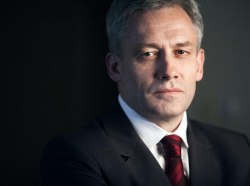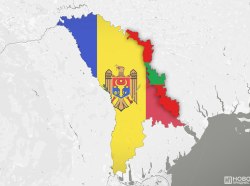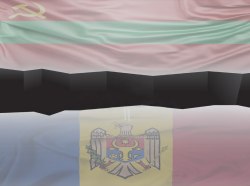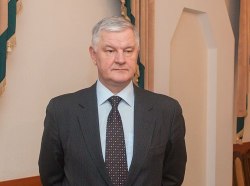On July 21, 1992, in Moscow, the agreement on the principles of peaceful settlement of the armed conflict on the Dniester was signed. It is difficult to overestimate the value of this document, as in terms of providing peace and safety in the region, creation of the negotiation process. In spite of the fact that Pridnestrovie was not a signer of the 1992agreement, the republic has actually received the party of negotiations status which on an equal basis with Moldova undertook certain obligations under guarantees of the Russian Federation.
The Trojan Horse behind a mask of Eirene
Attempts to stop bloodshed were also made till July 21, but all of them were inefficient and as showed time, were used by Moldova only for the distracting maneuver.
On April 12 «The protocol on peaceful settlement» was signed. This document provided removal of paramilitary groups from places of dislocation with the subsequent surrender of weapons by both parties. The point on unblocking of Bendery which had already been attacked on April 1 was one of the most basic paragraphs of the Protocol. Subsequently, the quadrilateral reconciliation commission including representatives of Moldova, Ukraine, Russia and Romania was created. All posts in the city were dismantled, the pridnestrovian armed divisions were brought to kilometer distance from Bendery.
It was seemed, the peace was close. On June 18 the Moldavian parliament made the decision on cessation of hostilities. For this decision the overwhelming number of deputies’ votes. But many generations of pridnestrovians will never forget about further events. On June 19, Friday, in the day of proms, the clear city will attack armed forces and armored vehicles of the RM. «Bringing of constitutional order», and in fact, the murder of innocent citizens will begin.
The events which took place after the beginning of the Bendery tragedy became the following attempt without the resolution of conflict result. Death of the civilian population and mass outflow of refugees became the red line which forced to stand up the international arbitrators.
On July 3 the meeting of the President of the RM and the President of the Russian Federation Mirchi Snegur and Boris Yeltsin took place, and on July 7 with the mediation of Russia, the military authorities of Moldova were forced to sign the Cease-Fire Agreement. However, the Moldavian side soon refused implementation of these arrangements. Bendery and Dubossary were fired from large-caliber tools, people died, the war continued…
8 pillars of peace
The morning release of one of the leading Russian newspapers Izvestia told on July 21, 1992, that the agreement on the principles of the peaceful settlement was ready to signing. For this purpose, the President of RM Mircha Snegur went to the Russian capital. Also, it was reported, with reference to the press service of the Government of Pridnestrovie in the capital of Russiathe head of the Pridnestrovian state Igor Smirnov would arrive.

There are 8 articles in the signed document. The first 4 of them concern the provisions regulating the withdrawal of troops and technicians, the realization of the peacekeeping operation under the auspices of the Russian Federation, creation of the JCC and definition of the Safety zone of the conflict. Other provisions, in fact, brought closer the future. To the Memorandum of 1997 according to which the PMR was granted the right of foreign economic activity freedom these aspects were stated in the basic document of 1992. In the agreement, there is Paragraph 1 of Article 5 in which it is told that parties of the conflict «consider the inadmissible application of any sanctions and blockade». At the same time, it is concretized that it is about hindrances to movement «goods, services and people».
By the way, the political negotiation platform («5+2») was created 10 years later after signing of this agreement. Before many aspects of the Moldo-Pridnestrovian settlement were discussed in the area of the JCC.
The mission is irreplaceable
Peacekeeping mission on the Dniester is one of the most successful in history. In 27 years after carrying out the operation, no one died in this armed conflict.
In many aspects, it is explained by a format of operation in which there are earlier conflicting parties. It should be reminded: the military contingents of Russia, Moldova and Pridnestrovie are parts of the Joint peacekeeping forces. The military personnel of three parties serve in common on the majority of peacekeeping posts on all line of the Safety zone stretched on 225 km.
It should be noted that the similar peacekeeping format had been tested in South Ossetia, friendly with Pridnestrovie. It should be reminded: The Sochi agreements had been signed on June 24, 1992, and on July 14 in South Ossetia, the peacekeepers appeared. However, in the South Ossetia the responsibility for carrying out the operation was conferred on the Mixed Control Commission (MCC) which (being the more political body) gathered irregularly and mainly in Moscow. Before bloody events 08.08.08, the Georgian peacekeepers completely left submission. And we all perfectly remember the result.
By the way, before the Georgian aggression of 2008, the country leaders tried to discredit as much as possible existing peacekeeping format. Various documents defining the Russian peacekeepers as invaders were accepted.
Similarly, in May 2017, the Constitutional court of Moldova qualified military presence of the Operational Group of Russian Forces in Pridnestrovie as illegal. Though, the Russian peacekeeping battalion is formed by the group structure. Further declarations with the requirement about an immediate withdrawal of Russian troops followed in the beginning from the Parliament of the RM, and then the UN General Assembly.
There is no wish to draw parallels, but it is obvious that constant appeals of the Moldavian leaders to change the peacekeeping operation format and a withdrawal of Russian troops do not do well to either negotiation process or regional security.
Pavel Mirov








